Royal Tramp, Royal Tramp 2 (1992)
Directed by: Wong Jing
Written by: Louis Cha, Wong Jing
Starring: Chingmy Yau, Natalia Chan, Ng Man-tat, Sandra Kwan, Sharla Cheung, Stephen Chow
THE ROYAL TRAMP COLLECTION:
ROYAL TRAMP [1992] – 110 mins
ROYAL TRAMP 2 [1992] – 93 mins
ON BLU-RAY: NOW, from EUREKA ENTERTAINMENT
REVIEWED BY: Dr Lenera
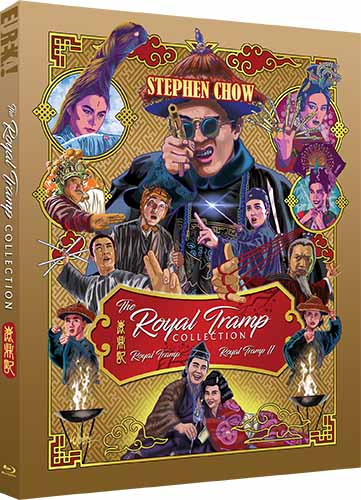
Wai Siu-bo works in a brothel, his job being to keep the johns entertained with stories before they’re serviced. One day there, the police ambush Chan Kan-nam, the leader of the revolutionary Heaven and Earth Society. Siu-bo hides Kan-nam and asks him to teach him kung-fu in return. Kan-nam accepts and inducts Siu-bo as his apprentice, with his first assignment being to infiltrate the palace and steal The Sutra of 42 Chapters, a martial arts instruction book of great renown. To get closer to said book, he signs on as a royal bodyguard to The Empress – but only eunuchs can be bodyguards for The Dowager Empress. Then he comes across the Emperor and his sister, and soon begins to play both sides against each other as well as rise up the ranks. Meanwhile, General Oboi is plotting to overthrow the Emperor, and then there’s also the One Armed Nun and Lung-er’s Dragon Sect….
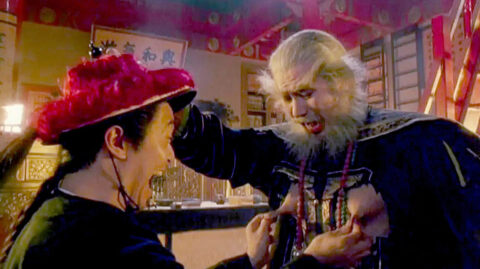
Made at perhaps the peak of Stephen Chow’s career in terms of both output and popularity [at least in Hong Kong; he did of course become an international star for a while with Shaolin Soccer and Kung Fu Hustle], Royal Tramp and Royal Tramp 2 were shot back to back and are essentially two parts of the same film. Now you could say that I’m being lazy by reviewing them both as one; film versions of novels as different as The Three Musketeers and The Lord Of The Rings usually have their episodes treated as separate parts, but said separate parts tend to have their individual identities and be released with around a year between them. This two-part adaptation of the oft-filmed Lu Ding Ji aka The Deer And The Cauldron, written by Louis Chau aka Jim Yong, a tale which must be the longest serialised story ever, appearing in a newspaper between 1969 and 1972 before becoming a novel, really is just one film split in two for commercial purposes, with the parts differing very little from each other and coming out only a few month apart. Therefore I’ve treated them as one entity. Oh – and I have three other reviews to do this week. In any case, this melds period intrigue and action with mo lei tau, the kind of Hong Kong “nonsense” or “anything goes” kind of humour made especially popular by Chow. Having recently viewed and reviewed Chow’s From Beijing With Love, I have to say that this didn’t hit my funny bone quite as hard, perhaps partly because the novel probably isn’t anywhere near as bonkers and the comedy, much of which is added, doesn’t seem as organic. However, one must of course remember that such veering from penis gags to wire-fu to twisty plotting should probably be expected by those experienced in Hong Kong cinema, and the switches in tone don’t really result in unevenness in a story which moves along at a fast pace, if perhaps slightly too fast a pace as it’s easy to miss or not understand the odd turn unless you’re totally paying attention. The production is lavish and the invention level high.
So, as text tells us, we’re in China, during the Qing Dynasty where the Manchurians were ruling China. There are three main forces at work; the Qings, who at the moment have a boy Emperor who’s not old enough to govern so four ministers do the work, General Oboi who’s becoming more and more powerful and is beginning to threaten the Emperor, and the Heaven And Earth Society of rebels, led by Kan-nam. First of all of course there’s a battle, with soldiers waving huge flags ambushed by men with hooks; it’s the rebels attacking Oboi, but Oboi is able to quickly dispatch all the assailants, something which is perhaps not surprising considering his great skill and strength, from running on the flags to lopping off the top of somebody’s head with just his fingernails. It’s a rather impressive beginning scene, though perhaps a little short, something that some may find is an issue with the action scenes in general, though then again the film is designed for the action not to overshadow the comedy and the plot. Our hero is first seen telling a story about Kan-nam to brothel customers, wildly exaggerating things and being accused of distracting customers from whoring. In the first of a long line of knob jokes, a punter has “penis shrinkage”. “Quick, call my sister, the capital’s intimacy scholar, the world’s number one beauty” cries Siu-bo, and she comes along, followed by a view from inside the hole into which the guy’s cock has shrunk into nothing, before a needle in the tailbone makes it reappear. Well, you’ll either laugh or not; I laughed. A lot. Into the place comes Kam-nan, but not after this police burst in. Kam-nan rewards Sui-bo’s help with a crash course in king fu over one night, much better than the Transcendental Martial Arts Manual which takes three years to read and thirty years of practice. However, he also gives him the Bone Dividing Palm, which will spread and eventually kill him.
On the day of the palace recruitment, Siu-bo accidentally stumbles into the eunuch room before being saved by Hoi Tai-fu, the palace’s head eunuch. Suspicious of the Empress Dowager’s identity and unable to confront her himself, Tai-fu strongarms Siu-bo into stealing her copy of the Sutra for himself, and we get one of the subtlest yet funniest gags, as Sui-bo looks directly at the camera, as if it were just something insignificant in his line of sight. Despite all the madness, it’s often the small things that work best. When Siu-bo is discovered, Tai-fu fights off the Empress, who possesses an unexpected level of combat prowess. Amidst the conflict, Siu-bo inadvertently befriends the Princess and the Emperor, thinking that they are eunuchs. The Emperor offers to give Siu-bo both his copy and the Empress’ copies of the Sutra if he can defeat the Emperor in a fight. Siu-bo fights dirty and wins, only to realize that the pair are royalty. When Siu-bo successfully maneuvers the Emperor around a political confrontation with Oboi, and the Princess uncovers that Siu-bo isn’t a eunuch himself, he’s promoted to the position of spy for the Emperor, told to keep an eye on Tai-fu and Oboi, but the Princess rather fancies Siu-bo to the horror of her mother [who’s played by an actress scarcely any older with no aging makeup]], leading to another semi-comic fight where Siu-bo accidently turns Tai-fu into a child-like state. Siu-bo may be rising in the Imperial ranks, but how long will it be before he’s found out and has not one but two Imperial armies after him? What’a going to happen when General Ng Sam-kwai, who also wants the throne, and his supporters the Dragon Sect, turns up? Will a disguised spy in the palace be discovered? And what about the One-Armed Nun?
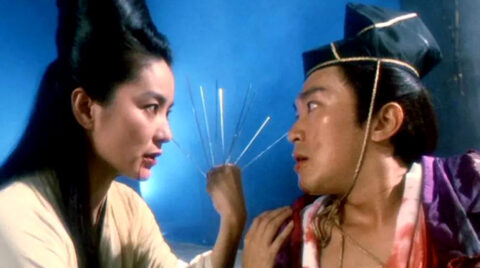
In fact there’s a lot more going on than even that, most notably lots of romantic shenanigans. The Princess is in love with Sui-bo but he has women practically falling at his feet, while somebody else fancies the Princess and two others are betrothed to each other. Of course this kind of thing is often used as a opportunity for gags, such as characters giving each a potion which makes one become extremely lustful unless it’s spat into the victim’s face, and then a poison whereupon the victim must have sex with someone before dawn otherwise or she will die. Perhaps these sections become a bit repetitive, and the number of penis gaga in part one is quite extraordinary, but I’m going to admit one thing; I love penis gags, so I was fine with this. For my puerile mind, a scene, for example, where Tai-fu shows Sui-bo a series of jars of penises in the palace, was about as good as it gets. Tai-fu tells Sui-bu that his penis is in the end jar, but Sui-bo can’t see it without a magnifying glass; then Tai-fu says that the cock is so small because he was one years old when it was severed. Now I can appreciate sophisticated humour too but unsurprisingly there’s little of that here, at least in terms of what I noticed, except perhaps the odd dig at politics which is perhaps rightfully described as all nonsense really. Of course you probably know to expect some un-PC material such as the line ” just rape me, don’t kill me”, the exchange “but she’s so dark”, “it’s all the same with the lights off”, and mildly anti-gay jabs, as well as perhaps speeded up shots, characters bursting into song, and breaking the fourth wall, though bad language is also pretty prominent in this one, with one scene repeatedly using the word “mother ******” , though I’m not sure if the translation was right in this instance; then again, it must be very hard to transpose Chinese verbal gags into a form that we might be able to understand. Again, it’s the little gags that sometimes stick, like our “hero” claiming his One Yang Finger killed several men at once while he hides a smoking pistol behind bis back.
The duels may not last long but they’re numerous, exciting and crammed with ideas as well as offering a hell of a lot of violent deaths – though some bloody awful early CGI sticks out. Wong Jing, the “Chinese Roger Corman” helmed these films as well as wrote them, but the action was actually directed by Tony’ Ching Siu-tung [A Chinese Ghost Story, Hero, Duel To The Death], and it certainly bears his hallmarks, so those who aren’t too fond of wirework may be advised to stay away as believable combat featuring incredible skill is hardly ever attempted, but the rest of us can enjoy the often visually striking combat. Most of the characters gets to go up against each other, often in the first film being more displays of superiority than fights to the death, the mass battles ramping up in the second film. There’s impressive choreography and crazy violence such as an exploding horse and several people being severed from head to toe. One bunch of fighters are controlled like puppets and armed with golden rings which may be deadly I suppose but which our hero just juggles. Later on he pinches lots of nipples and kills lots of people with frozen spit, but believe me, there are set pieces that don’t become comical. There’s a stunning battle in the woods, with running up trees, the hurling of a tree trunk and a chase on symbols, while Brigitte Lin gets a lot of stuff to do, including battling Helen Ma [the One-Armed Nun] on a moving cart and firing more ribbons than anybody has ever done in a wuxia film. Fans of hers in period action, of wbich I consider myself one, will be very pleased, and her character becomes interesting too. Chingmy Yau also looks fabulous, In fact Jing’s script, no doubt following the novel at least in this respect, does his best to give most of the character a modicum of depth even when it’s a bit hard to keep up with what they’re all up to. And we get not one but two female characters being mistaken for male despite not exactly disguising the fact that they’re female!
Chow, depite playing somebody who sees a lot of important events far more than he takes part in, seems like he’s not going to get much of a chance to show his quite considerable martial arts skills, but these increase and the final battle sees him pulling off some very clever moves. Sui-bo is cocky and out for himself, but his “take what comes” mindset is oddly believable given the increasingly bizarre circumstances in which he finds himself. Chow has such a likeable screen presence, and his habit of falling flat on his feet here helps greatly in allowing us to sympathise with him; we don’t mind him, for example, becoming the Emperor’s confidante even though he’s got his own agendas. It’s nice how he’s initially the only goofy major character except for Tai-Fu, but more and more others join him in being silly. His usual chemistry with Adam as Tai-Fu is allowed to shine throughout. This one was clearly given a sizeable budget [well by Hong Kong film standards], with impressive set design and costumes, though did music composer Wai Lap Wu’s main theme have to be such an obvious copy of On The General’s Orders aka The Wong Fai-Hong Theme? The cinematography goes back and forth in style, even becoming straight out of a Hong Kong horror movie at times, sometimes while the fog machine goes wild at the same time. David Chun and Henry Chan shot the first one, then Chun did number two on his own. Can we spot a difference? The second film has a lot of first-person shots which the first one has none and is slightly less resplendent in look. But, despite my feelings about some of the comedy feeling just plonked on and outstaying its welcome, both of these films are absolutely insane fun.
Rating: 









SPECIAL FEATURES
Limited Edition O-Card slipcase featuring new artwork by Darren Wheeling [2000 copies]
Brand new 4K restorations of both films, presented in 1080p HD across two Blu-ray discs
This is another excellent restoration. The second film is slightly paler than the first, which is odd though may still be true to the original presentation. The colours are rich, the grain very evenly balanced and the detail vivid.
Original Cantonese audio tracks
Optional English dubbed audio
Optional English subtitles newly translated for this release
Brand new audio commentaries on both films by cinema expert Mike Leeder and filmmaker Arne Venema
I almost feel that I’m doing these two wonderful tracks a disservice by reducing them to one review. The wonderful interaction between these two can be summed up in a very early part of the track on the first film. Venema tells us that the Heaven and Earth Society still exists, and in several Asian countries with their head office reportedly in Honolulu, though in Hong Kong they have connections with the Triads. “So not very popular”. “Depends on who you ask” replies Leeder. Leeder usually tends to lead and say more in their commentaries, but here Venema is virtually dominate in spots, even if Leeder tells my favourite story of the track, of when he was helping a friend move house and they were taking some martial arts weapons up in a lift. When the door opened, they saw Jimmy and Charles Herne, the former the co-producer and both linked with the Triads, with a body. The brothers certainly made it known that they should keep their mouth shut. Leeder also provides some bizarre details about cast members, from one becoming a producer of just two films, one a remake of the other, to another claiming demonic possession, and Hong Kong’s bizarre censorship [i.e. swearing in Cantonese is unacceptable but in other languages it’s fine and often plentiful. Meanwhile Venema tells us some verbal jokes and extra verbal bits to jokes which make them even funnier, reminds us that Chow is speaking modern-style Cantonese throughout but nobody else is, and points out details in the filmmaking. And just wait until you here the weird case of actor Yan Si Gwan’s age, or the English language version of a film you can only find in Holland on video, or – well I’ve said far too much already. The duo are on top form and clearly loving discussing these films, films which I think I like a bit more now. What a track!
Brand new audio commentaries by Asian film expert Frank Djeng and producer F.J. DeSanto
I sometimes feel that I haven’t given Djeng his due, because I usually emphasise that I enjoy the Leeder / Venema tracks so much. But this walking talking encyclopedia on Hong Kong cinema really delivers here, and DeSanto is his perfect accompaniment, even providing the first introduction which seems very rare indeed in a Djeng track, though of course certainly haven’t heard them all. De Santo thinks that this is respectful to the novel and holds back on the usual Chow madness; I don’t really agree with the second of those two statements but he knows far more about the book than I do. He and Djeng also points out a lot of references to other films and books [I picked up on four, which is decidedly unimpressive], while Djeg is especially strong on comparing the film with the book, which covers a much greater time period. Royal Tramp seems to be fairly close to then novel, such as notable differences in the first part being Sui-bo’s prostitute sister originally being his mother and him originally killing the eunuch who befriends him and taking his place, while in part two Sui-bo spends time in both Russia and the Shaolin Temple, and the One Armed Nun isn’t even present. Djeng, as expected, is great on explaining cultural stuff, going even further than Venema, such as telling us that the first letters of the animals whose cocks are in jars making up the Chinese word for Viagra, and making one of my favourite funny bits even funnier, while unlike me DeSanto sees a fair few differences in the look and the filming style of the second one to the first. Apparently this film was only one of five Chow films which made up the top five box office placements of 1992. God he was popular. This track ends up being as rewarding as the one before it.
Two archival interviews with Wong Jing about “Royal Tramp” and the Jin Yong novel the story is based on [9 mins, 11 mins] This feels like two parts of one interview split over the two discs rather than two separate ones, but Jing talks with enthusiasm about the whole production which he clearly sees as a highlight of his career, even if he says that Chow “was not very good” at kung fu, something I’d disagree with, while I never picked up on all his films being about “class struggle”. He’s most interesting on the historical background [it’s easy to forget that these films are loosely based on real events with some real characters], and on shooting this back to back with City Hunter six hours on each film every night.
A career spanning interview with veteran Hong Kong actress Helene Law Lan courtesy of the Frédéric Ambroisine Video Archive [14 mins]
Well, being a major Bruce Lee fan, I was very interested to learn that Law worked with him on The Kid, and she recalls him being naughty, such as ringing up numbers from the phone book and pretending to be a ghost. The very smiley Law, who tell her interviewers that they’re “so smart in being able to find information” also discusses some of her many other films, such as the ten-movie Troublesome Ghost series, and says that she forgets a lot of her old films.
Trailers
A limited edition collector’s booklet featuring new writing on the films [2000 copies]
Despite containing less extras than we’ve come to expect from these, the commentaries are absolutely fabulous, and this release would do well as a crash course in Hong Kong cinema for the uninitiated. Highly Recommended!


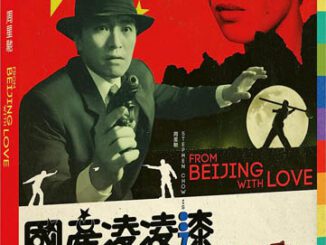
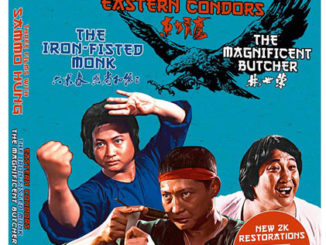
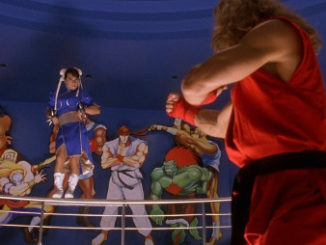
Be the first to comment